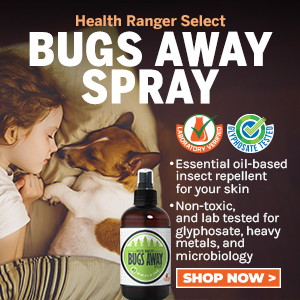
Beauty to die for: health hazards of cosmetics and skin care products revealed
Friday, January 20, 2006 by: Leigh Erin Connealy, M.D.
Tags: skin care, cosmetics, alpha hydroxy acid
- Solar storm sparks concern as supervolcano nears eruption: Could sun's electromagnetic pulse trigger cataclysm?
- Pfizer’s election meddling exposed: Top scientists weaponized science to sway the 2020 vote, so they could benefit from unlawful mandates
- Mysterious hexagonal UFO sighting over California sparks questions amid government secrecy
- The hidden dangers of oversleeping: How too much rest harms cognition, fuels depression, and shortens life
- “Cancer-Free with Food”: A culinary revolution in the fight against disease
- The water cure: Unveiling the hidden link between dehydration, obesity, cancer and depression
- Trump’s Gulf tour sparks Iran nuclear deal breakthrough amid regional shifts
- Gum bacteria invade heart, trigger dangerous heart rhythm problems
- WHO's PANDEMIC AGREEMENT just a ploy to CONTROL every aspect of any SCAMDEMIC they declare at any time and indefinitely
- Zero-waste bean cooking: Repurposing pinto bean broth in soups or bread
- RFK Jr. announces simplified federal dietary guidelines promoting whole foods, slams past industry influence
- Unlocking the power of polyphenols: A new frontier in disease prevention and treatment
- James Comey's posts cryptic ’86 47′ message and gaslights the public after being confronted with passive aggressive death threat to President Trump
- Forever chemicals” invade Australian water supply: Investigation yields torrent of carcinogens, signifying vast regulatory failure
- Saw Palmetto: The mighty berry for men's health and beyond
- EXPENSIVE CANCER THERAPY promoted in New Zealand while ignoring the very CAUSE of their shockingly high rate of lymphoma cases
- New Jersey Transit engineers strike halts rail service, stranding 350,000 commuters
- Unveiling the hidden impact of trauma: How unresolved pain shapes health and happiness
- WAR ON COGNITION: The Coordinated Assault on Your Brain and How to Defend Yourself Against Every Attack
- Canada's COVID cover-up: Health officials swore secrecy to protect Trudeau from vaccine scandal
- Singapore's draconian vaccine mandate: Citizens face jail time for refusing FORCED medical procedures that do HARM
- Big Pharma's Dirty Secret: How Prescription Drugs Are Starving Your Body of Essential Nutrients
- Gene-edited pork sneaks onto your plate: FDA quietly approves CRISPR pigs amid health and ethical concerns
- RED ALERT: Nuclear War Between India and Pakistan Could Trigger Global Catastrophe… full RISK ANALYSIS
- JESUS NEVER SPOKE ENGLISH: Historical facts on why the Bible you’re probably reading has been altered, redacted or hidden from much of its original meaning
- Hidden poison in your medicine and supplements: How phthalates in capsules are silently attacking your heart, thyroid, and hormones
- BBC accused of “political censorship” for shelving Gaza documentary amid mounting pressure
- Brushing with poison: Study finds toxic heavy metals in 90% of toothpaste brands, including those for children
- Australia’s vaccine cover-up: 35 died same day as COVID shot, but authorities ignored them
- Why All Government Officials and Big Tech CEOs Who Engage in Systematic Viewpoint Censorship Must Be ARRESTED, Prosecuted, and Sentenced to Life in Prison
- Silent catastrophe: COVID-19 vaccines linked to plummeting fertility rates, Czech data reveals
- Survival basics: 5 Dangerous locations to avoid during an EMP attack
- X-class solar flare sparks worldwide disruptions, with more storms expected as sunspot turns toward Earth
- The truth about Benzyl Alcohol in beauty products
- DOJ targets controversial “Proximal Origin” study in push for scientific transparency
- Landmark study of 85 million reveals shocking surge in heart attacks, strokes, and sudden death following the notorious COVID-19 jab
- The Miraculous Healing Power of DMSO: Nature's Forgotten Cure for Cancer, Pain, and Regeneration
- Biblical truth: God will carry out a “cosmic reset” of Earth and destroy all human civilization with a series of extinction-level cosmic impacts known as The Seven Trumpets, Seven Bowls and Seven Seals
- URGENT REPORT: The China Import Embargo - What to Stockpile Now Before America Runs Out
- The Ultimate Survival Guide to Baking Soda: A Miraculous, Multi-Purpose Remedy for Health, Home, and Emergency Preparedness
- A call to preserve America’s future: “Defeating Big Government Socialism” by Newt Gingrich
- Stunning Visualization of the Seven Trumpets in the Book of Revelation
- Big Pharma launches “Vaccine Integrity Project” to combat Secretary Kennedy and keep 94 shots going into kids with mandates and liability protections
- World Economic Forum's current downfall exposes legacy of totalitarianism, financial fraud, and crimes against humanity
- Widespread social and economic unrest: Steve Quayle issues urgent financial warning of imminent asset collapse in new interview with Mike Adams
- Aerosolized bioweapons? Strange “diploid biomasses” falling out of the sky in Florida captured under the microscope
- Biden regime deployed over 600 grants to fund disinformation agenda, to silence the truth and stifle debate
- The Miraculous Healing Power of Green Tea: Unlocking the Potent Antioxidants That Big Pharma Doesn't Want You to Know About
- The unspoken truth about chemotherapy: These “treatments” create toxic time bombs in your body called CELL-KILLING PARTICLES
- U.S. Government's Bio-War Against America: 15 Historical Medical Horrors Inflicted on the American People by the Government Itself
- A win for free speech: State Department SHUTS DOWN controversial disinformation office
- French rioting demonstrates how gun control laws are failing law-abiding citizens
- Head of L.A. Port warns of incoming plunge in U.S. supply chain, empty shelves and inventory depletion in 5-7 weeks
- Supreme Court to review challenge to Illinois’ semi-automatic gun ban
- Red Cross issues warning to stop blood plasma donations from vaccinated people
- Scientists confirm: GENIUS brain function can be spontaneously unleashed in humans without any apparent cause
- EPA advisor admits the agency is funneling billions to climate groups ahead of Trump’s return to White House
- HYSSOP: What research reveals about the health benefits of this ancient holy herb
- Two containers with completed ballots fall out of truck in Florida
- Newly released JFK files reveal Pentagon's role in creating Lyme disease and covid in the same lab
- Mike Adams releases country western hit single: Goin’ Back in Time is Comin’ Home
- Global leaders unite to clamp down on “misinformation” with UN-backed Cascais Declaration
- BREAKING: 2025 NDAA authorizes mandatory military draft of WOMEN across America… as Pentagon pursues global NUCLEAR war with both Russia and China at the same time
- I Want My Bailout Money – new song released by Mike Adams
- Michael Yon warns of a ZIONIST TAKEOVER in Trump’s second administration
- Ozempic and Wegovy weight loss drugs are injectable LIZARD VENOM PEPTIDES that may unleash a devastating wave of organ failure… side effects align with symptoms of SNAKE BITES
- BOMBSHELL: DNA testing kits are a SCAM to develop ethnic-specific bioweapons
- The Health Ranger releases “Vaccine Zombie” song and music video, using AI-animated zombies for the music video
- These 13 countries just signed an agreement to engineer a global FAMINE by destroying food supply
- Israeli soldiers accused of even more torture and abuse in the West Bank
- RFK Jr. clears key hurdle: Sen. Susan Collins backs controversial HHS nominee, signaling a new era for health policy
- Sermon 30: How Jesus reveals Caesar’s FAKE CURRENCY and FALSE AUTHORITY
Like most people, you probably assume that the ingredients found in beauty products have been thoroughly tested for safety well before they land on your grocery store's shelves. After all, the government has regulations in place for the water we drink, the food we eat and the air we breathe. One would assume that the FDA would also be overseeing the cosmetic industry to ensure the health and safety of consumers. Unfortunately, the FDA has little power when it comes to regulating the ingredients found in your beauty products. In fact, the only people ensuring the safety of personal care products are the very people who govern the industry: The Cosmetic Toiletry and Fragrance Association (CTFA). Scientists paid by the CTFA make up the Cosmetic Ingredient Review panel (CIR) and are charged with regulating the safety of the industry's products.
In 2004, the Environmental Working Group (EWG) released the findings of a study it conducted regarding the safety of beauty care products. Comparing approximately 10,000 ingredients found in 7,500 different products against lists of known and suspected chemical health hazards, the research revealed that the CIR was falling tragically short of ensuring consumer safety.
Of the 7,500 products tested by the EWG, a mere 28 had been evaluated for safety by the CIR. The EWG found that one in every 120 products analyzed contained ingredients certified by the government as known or probable carcinogens and that nearly one-third of the products contained ingredients classified as possible carcinogens. Astoundingly, 54 products even violated recommendations for safe use that the CIR had put in place, yet these products are still available for sale today.
Of the products tested, the worst offenders were those containing the cancer-causing ingredients coal tar, alpha hydroxy acids and beta hydroxy acids, and those containing the hormone-disrupting ingredient, phthalate.
Coal Tar
Seventy-one hair dye products evaluated were found to contain ingredients derived from coal tar (listed as FD&C or D&C on ingredients labels). Several studies have linked long-time hair dye use to bladder cancer, non-Hodgkin’s lymphoma and multiple myeloma.A research study conducted in 2001 by the USC School of Medicine found that women using permanent hair dye at least once a month more than doubled their risk of bladder cancer. The study estimates that "19 percent of bladder cancer in women in Los Angeles, California, may be attributed to permanent hair dye use."
A link between hair dye and non-Hodgkin's lymphoma was established in 1992 when a study conducted by the National Cancer Institute found that 20 percent of all cases of non-Hodgkin’s lymphoma may be linked to hair dye use.
While the FDA has not stepped in to prevent the use of coal tar in beauty products, it does advise consumers that reducing hair dye use will possibly reduce the risk of cancer.
Alpha Hydroxy Acids (AHA) & Beta Hydroxy Acids (BHA)
Alpha Hydroxy Acids and Beta Hydroxy Acids are commonly used in products advertised to remove wrinkles, blemishes, blotches and acne scars. With consumer complaints of burning, swelling and pain associated with AHA and BHA flooding into the FDA, the regulatory body began conducting its own research about 15 years ago. The findings linked the use of AHA and BHA with a doubling of UV-induced skin damage and a potential increased risk of skin cancer.According to the Environmental Protection Agency, skin cancer has reached "epidemic proportions," with 1 million new cases occurring each year and one person dying every hour from the disease. The agency estimates that, at the current rate, one in five people will develop skin cancer over their lifetime.
The FDA's study findings were presented to the CIR, but the panel approved the continued use of AHA and BHA "in spite of serious safety questions submitted by a consumer group and a major manufacturer," according to an FDA spokesperson.
Even though one out of every 17 products analyzed by the EWG study contained either AHA or BHA (with nearly 10 percent being moisturizers and 6 percent sunscreens), the most that the FDA could do was suggest that products containing the ingredients carry a warning to use sunscreen and to limit sun exposure while using the product. A puzzling solution, since some of the products containing the dangerous ingredient are designed specifically for use in the sun.
Phthalates
Phthalates are industrial plasticizers widely used in personal care products to moisturize and soften skin, impart flexibility to nail polish after it dries and enhance the fragrances used in most products. Studies indicate that phthalates cause a wide range of birth defects and lifelong reproductive impairments, targeting every organ in the male reproductive system and causing problems ranging from low sperm count to serious genital deformities that can lead to an increased risk of cancer.While the EWG only found four products with phthalate listed as an ingredient (all nail care products), there is no telling how many products actually contain it. The industry is not required to list fragrance ingredients or "trade secret" ingredients on products, and phthalates often fall into one of those two categories.
In September 2004, the European Union implemented a ban on all beauty products containing phthalates. California Assemblywoman Judy Chu has proposed a similar bill (AB 908) to be voted on later this year that would implement the same ban in the United States. Opponents of the bill, mainly the CTFA, argue that changing labeling processes would present a huge economic burden and could infringe on trade secrets. A similar bill failed just last year.
Four Steps of Action
1. Go to www.ewg.org and check out the health risks of your favorite products. EWG has compiled a guide of 7,500 beauty care products and has ranked them according to their ingredients' potential to cause cancer, trigger allergic reactions, interfere with the endocrine (hormonal) system, impair reproduction or damage a developing fetus.2. Visit the FDA's website at www.fda.gov and familiarize yourself with the steps that you can take in order to file complaints or concerns about consumer products.
3. Visit www.safecosmetics.org to learn more about how you can become involved with bill AB 908 to ban phthalates in beauty products in the United States.
4. Check out my recommendations for all-natural and safe products for both you and your family at www.scmedicalcenter.com. All products mentioned have been used safely and with wonderful results by my patients for years.
Dr. Connealy, M.D., M.P.H., began private practice in 1986. In 1992, she founded South Coast Medical Center for New Medicine where she serves as medical director. Her practice is firmly based in the belief that strictly treating health problems with medications does not find the root cause of the illness. Dr. Connealy writes monthly columns for Coast and OC Health magazines, and is a bi-weekly guest on Frank Jordan's "Healthy" radio show. She routinely lectures and educates the public on health issues.
Skin care at FETCH.news
Get independent news alerts on natural cures, food lab tests, cannabis medicine, science, robotics, drones, privacy and more.
Take Action: Support Natural News by linking to this article from your website
Permalink to this article:
Embed article link: (copy HTML code below):
Reprinting this article:
Non-commercial use OK, cite NaturalNews.com with clickable link.
Follow Natural News on Facebook, Twitter, Google Plus, and Pinterest
Science News & Studies
Medicine News and Information
Food News & Studies
Health News & Studies
Herbs News & Information
Pollution News & Studies
Cancer News & Studies
Climate News & Studies
Survival News & Information
Gear News & Information
News covering technology, stocks, hackers, and more



"Big Tech and mainstream media are constantly trying to silence the independent voices that dare to bring you the truth about toxic food ingredients, dangerous medications and the failed, fraudulent science of the profit-driven medical establishment.
Email is one of the best ways to make sure you stay informed, without the censorship of the tech giants (Google, Apple, Facebook, Twitter, YouTube, etc.). Stay informed and you'll even likely learn information that may help save your own life."
–The Health Ranger, Mike Adams













































